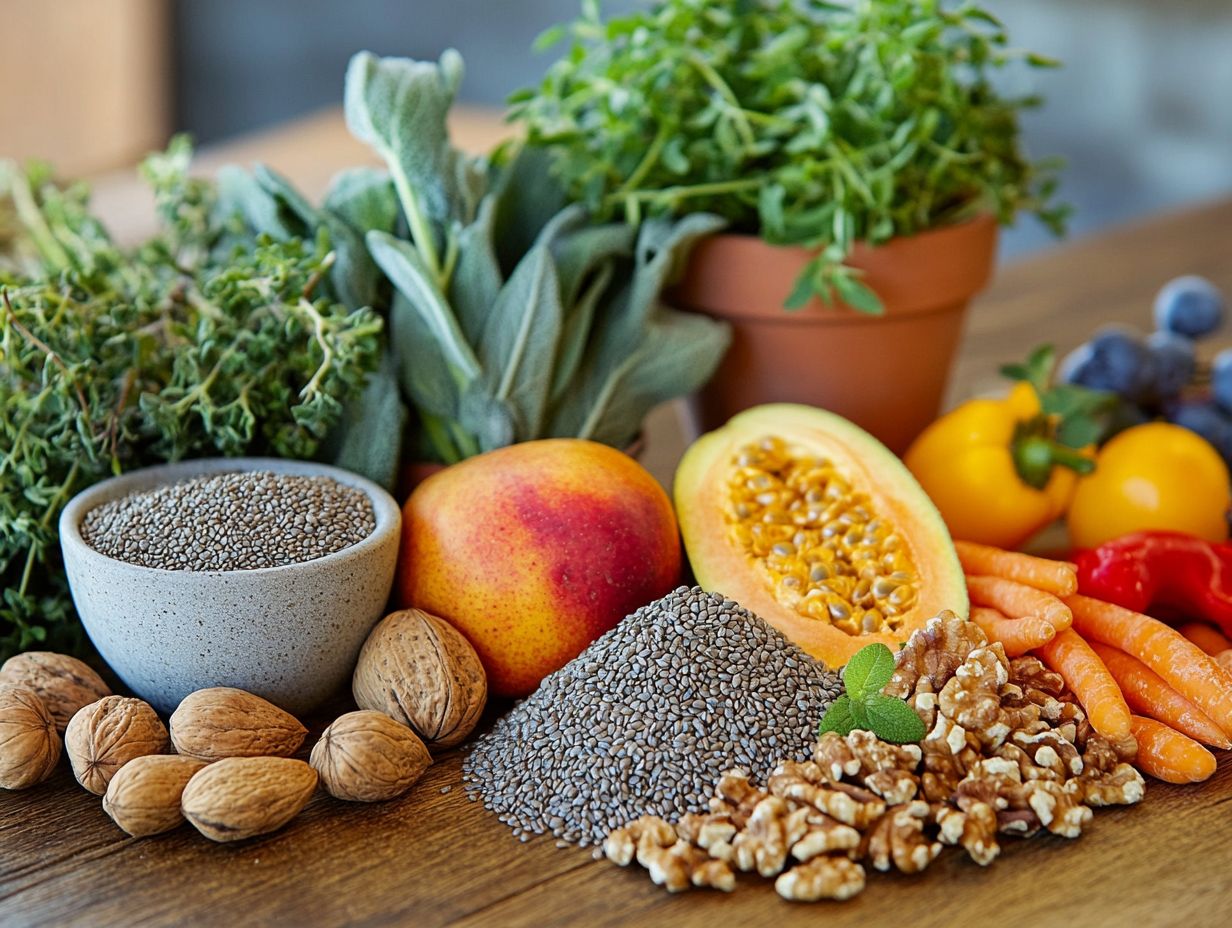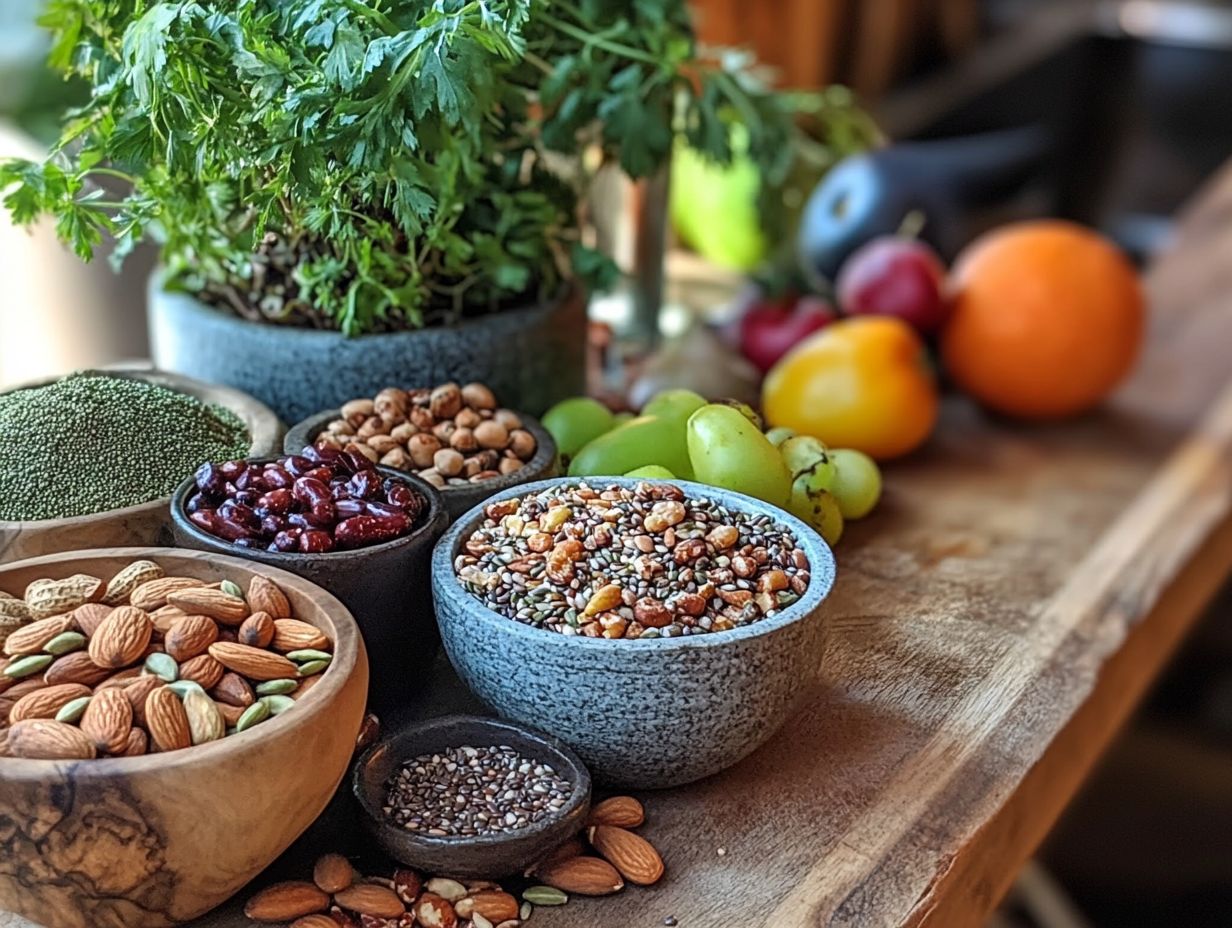What Are Functional Foods in Holistic Nutrition?
In today s health-conscious landscape, functional foods are emerging as essential players in holistic nutrition.
These remarkable food items do more than simply nourish your body; they also provide targeted health benefits that can elevate your overall well-being.
Join us as we explore the exciting world of functional foods and discover how they can transform your diet!
This article delves into the various types and advantages of functional foods while guiding you on how to effortlessly weave them into your daily diet.
It also addresses potential risks and emphasizes the significance of consulting with a nutritionist to make informed choices.
Uncover how functional foods can revolutionize your approach to nutrition!
Contents
- Key Takeaways:
- Understanding Functional Foods
- Types of Functional Foods
- Incorporating Functional Foods into Your Diet
- Potential Risks and Precautions
- Frequently Asked Questions
- What Are Functional Foods in Holistic Nutrition?
- How are functional foods different from regular foods?
- What types of foods fall under the category of functional foods?
- How do functional foods support holistic nutrition?
- Can functional foods replace traditional medical treatments?
- Are there any potential risks or side effects of consuming functional foods?
Key Takeaways:

- Functional foods are whole, natural foods that offer unique health benefits beyond basic nutrition.
- Examples include turmeric, salmon, and leafy greens, which can support overall health and target specific concerns like inflammation and digestion.
- To incorporate functional foods into your diet, consult with a nutritionist and try new recipes that feature these nutrient-packed ingredients in delicious and practical ways.
Understanding Functional Foods
Functional foods are more than just a meal. They serve as a gateway to enhanced health.
These foods not only fulfill your basic nutritional needs but also offer remarkable health benefits, especially when it comes to tackling issues like heart disease, digestive challenges, and cholesterol management. The notion of “food as medicine” is gaining momentum as you become increasingly aware of how your dietary choices impact your overall well-being.
By emphasizing key elements such as dietary fiber, omega-3 fatty acids, and antioxidants, these foods play a crucial role in boosting heart health and managing cholesterol levels effectively.
Incorporating probiotics and fermented foods into your diet alongside whole grains, healthy fats, and a colorful array of vegetables and fruits can greatly elevate your nutrient intake, setting the stage for optimal health.
Definition and Role in Holistic Nutrition
The definition of functional foods goes beyond basic nutrition; these foods are crafted to deliver specific health benefits, reflecting the idea that food can act like medicine. Understanding the role of supplements in holistic nutrition further enhances this concept.
This perspective emphasizes how your dietary choices can significantly impact holistic nutrition.
With a focus on enhancing wellness and tackling health issues, functional foods include elements like vitamins, minerals, and phytochemicals that contribute to your overall health, which ties into understanding the science behind holistic nutrition.
These foods influence everything from metabolism to inflammation levels. By incorporating them into your daily meals, you can nourish your body while adopting a proactive approach to health management.
For example, foods rich in antioxidants help neutralize harmful free radicals, reducing your risk of chronic diseases like heart disease and diabetes.
Their role in gut health through prebiotics and probiotics highlights the need for a balanced microbiome, showcasing how functional foods can become powerful allies in your journey toward overall well-being.
Types of Functional Foods
You ll discover various categories of functional foods, including the renowned superfoods, celebrated for their remarkable health benefits and their capacity to nourish the body, particularly in the prevention of chronic diseases.
These foods, often abundant in omega-3 fatty acids, probiotics, and dietary fiber, are essential for enhancing heart health, improving digestive function, and lowering cholesterol levels.
Furthermore, foods rich in antioxidants, like an array of vibrant vegetables and fruits, significantly contribute to your overall well-being, making them critical elements of a balanced diet.
Start integrating functional foods into your meals today for a healthier tomorrow!
Examples and Benefits

Functional foods are everywhere, inviting you to explore their incredible benefits. Discover the amazing health advantages these foods can offer!
Consider superfoods like salmon and sardines, which are packed with omega-3 fatty acids, or the nutritional powerhouse of legumes and whole grains, rich in dietary fiber and essential nutrients. Adding probiotics from fermented foods can work wonders for your gut health.
The antioxidant-rich fruits and vegetables help fend off oxidative stress. Don t overlook options like spinach and kale, celebrated for their high vitamin K content, essential for bone health.
The flavonoids in berries, a type of antioxidant, enhance your cardiovascular wellness by improving circulation. Let s not forget oats; their fiber not only supports digestive health but also helps regulate cholesterol levels effectively.
Incorporating nuts, especially walnuts, brings heart-healthy fats into your diet, potentially benefiting your brain function. Each of these functional foods contributes uniquely to your overall wellness, underscoring the significance of maintaining a balanced and nutrient-dense diet.
Incorporating Functional Foods into Your Diet
Incorporating functional foods into your daily diet can be a delightful experience that also offers significant health benefits. These foods are packed with essential nutrients that enhance your overall wellness.
One effective approach is to whip up delicious recipes that showcase a range of energy-dense options. You can enjoy the omega-3 fatty acids found in salmon and sardines, dietary fiber from legumes and whole grains, and probiotics present in fermented foods.
By prioritizing a colorful array of vegetables and fruits, along with healthy fats like extra virgin olive oil, you can craft meals that tantalize your taste buds. These meals not only promote heart health but also aid digestion.
Practical Tips and Recipes
Practical tips for incorporating functional foods into your diet include exploring various recipes that feature omega-3 fatty acids. Think of delicious grilled salmon dishes or hearty soups brimming with legumes to elevate your dietary fiber intake.
Incorporating a medley of vegetables and fruits adds delightful variety to your meals and amplifies the health benefits of these functional foods. To elevate the nutritional profile of your meals even further, consider adding chia seeds or flaxseeds to your smoothies or yogurt.
These tiny powerhouses provide additional omega-3s that can significantly enhance heart health. When preparing grains like quinoa or brown rice, fold in some saut ed spinach or kale for an extra boost of vitamins and minerals.
For breakfast, think about topping your oatmeal with fresh berries and nuts. It s the perfect combination of antioxidants and healthy fats. Embrace simple cooking techniques like steaming instead of frying; they help maintain the nutrient value of your vegetables.
By doing this, you can savor flavorful dishes while maximizing their health benefits.
Potential Risks and Precautions
While functional foods present a wealth of health benefits, it’s crucial to remain mindful of the potential risks and precautions linked to their consumption, especially if you have specific health concerns.
Seeking the expertise of a nutritionist can offer invaluable insights into how to safely integrate these foods into your diet, ensuring they enhance your overall well-being.
Keep in mind that some individuals might encounter digestive discomfort from high levels of dietary fiber or probiotics found in fermented foods. This highlights the importance of approaching these foods with both awareness and the right guidance.
Unlock Your Health Potential by Consulting with a Nutritionist!

Consulting with a nutritionist can be a transformative step in seamlessly integrating functional foods into your dietary routine. They provide personalized advice tailored to your unique health needs and goals, ensuring you fully harness the benefits of these foods while minimizing any potential risks or adverse reactions.
Nutritionists carefully assess a range of factors, including your age, activity level, and any existing health conditions. They craft a custom plan to optimally incorporate foods rich in antioxidants, probiotics, and omega-3 fatty acids. Through this thorough evaluation, they might suggest specific functional foods, such as chia seeds for their impressive fiber content, fermented foods to promote gut health, or berries renowned for their antioxidant prowess.
By doing so, they empower you to make well-informed dietary choices that not only bolster your overall wellness but also enhance specific health outcomes, like improved digestion or reduced inflammation.
Frequently Asked Questions
What Are Functional Foods in Holistic Nutrition?
Functional foods are whole, unprocessed foods that provide specific health benefits beyond their basic nutritional value. In holistic nutrition, understanding what role whole foods play is essential, as these foods are selected based on their ability to support overall wellness and help prevent or treat specific health conditions.
How are functional foods different from regular foods?
Functional foods pack special benefits that go beyond basic nutrition! While regular foods primarily provide basic nutrients such as carbohydrates, proteins, and fats, functional foods contain unique compounds or properties that provide additional health benefits. They are also selected and prepared for their medicinal or therapeutic properties, rather than for taste or convenience.
What types of foods fall under the category of functional foods?

- Fruits
- Vegetables
- Whole grains
- Legumes
- Nuts
- Seeds
- Certain herbs and spices
How do functional foods support holistic nutrition?
In holistic nutrition, functional foods are selected based on their ability to provide essential nutrients and support the body’s natural healing processes. Understanding what foods are essential in holistic nutrition can help prevent or treat specific health conditions and are often used in conjunction with other holistic practices, such as herbal medicine and acupuncture, to promote overall wellness.
Can functional foods replace traditional medical treatments?
No, functional foods should not be used as a replacement for traditional medical treatments. While they can provide valuable nutritional support and may have some therapeutic benefits, they are not a substitute for medical intervention when necessary.
Are there any potential risks or side effects of consuming functional foods?
In general, functional foods are safe for most people to consume. However, it is important to consult with a healthcare professional before incorporating large amounts of any new food into your diet, as some foods may interact with certain medications or health conditions.
Start your journey to better health today! Consider booking a consultation with a nutritionist to tailor your dietary choices to your unique needs.





